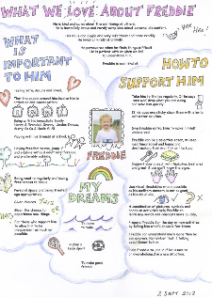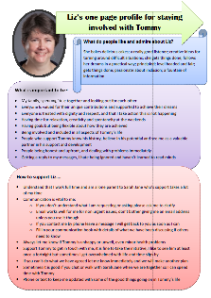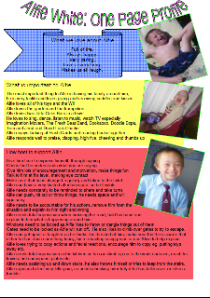A wonderful example of how this boy’s one-page profile communicates all the things he can do, loves to do and that are important to him. Freddie’s mum felt that before using the one-page profile she’d be introducing her son with a long list of things that he struggles with. Now she has the perfect way of introducing him as the kind, brave, caring, giggly and perseverant boy that he is.
Written By Freddie’s mum Tracee
When my son Freddie first started school, I hadn’t heard about one-page profiles. And so I made a list of everything I thought his new school might need to know as Freddie has Down’s Syndrome and sometimes needs a little extra help to go about his day in the best possible way. Reading the list out loud, compiled mostly of things he struggles to achieve, to the assembled faculty was fairly depressing – and not just for me I imagine!
When I created Freddie’s first one-page profile I didn’t know too much about them, except that I liked the concept. And though it was a step forward, it wasn’t as balanced as it could be and crossed into what our family needed instead of focusing solely on Freddie’s needs. I’ve since had access to a book and workshop on the subject and now we include the people in Freddies life and as much as possible, Freddie himself, in compiling new versions and we update it every year.
We use the profile whenever Freddie starts a new class, goes to summer camp or joins a new club. Even summer camps he has attended in previous years appreciate an update on where Freddie is in life at that time.
When we hand out Freddie’s profile, we know we are giving Freddie the best possible chance of success in a new setting. Not just for him, but also for the person charged with caring for him. And in our family, successful days usually equal very happy days.
We’ve had very positive feedback from camp orgnanisers, who look forward to meeting this smiling boy who loves to read and run and jump outside. They like that they can quickly understand how best to support him and who of their team is best placed to provide that support.
Importantly the profile focuses as much on what Freddie can do and likes to do as it does what he needs support with. I feel this means he isn’t underestimated when he goes somewhere new. It means someone has information to build the foundations of friendship on and can suggest activities they can do together that he will like.
At school, when we presented the profile to the new class teacher she took it to the Head, who could immediately see how useful this simple person-centred thinking tool could be and said she was going to recommend that all children with special needs in the school had one.
Freddie’s younger sister Eden doesn’t have special needs. But when Eden starts school, I’ll be providing her teacher with a profile all the same as I want her to have the same opportunities for success as her brother. I can see the benefit in all children having one-page profiles in school and this is something I would love to happen.
I worry less about Freddie starting something new. Everyone involved gets the opportunity to start with their best foot forward and that can only be a positive thing.
We’re due to update the profile in the summer and as Freddie is that bit older (he is six now) I’m looking forward to including him a little bit more and recognising how much he has grown during the year.





